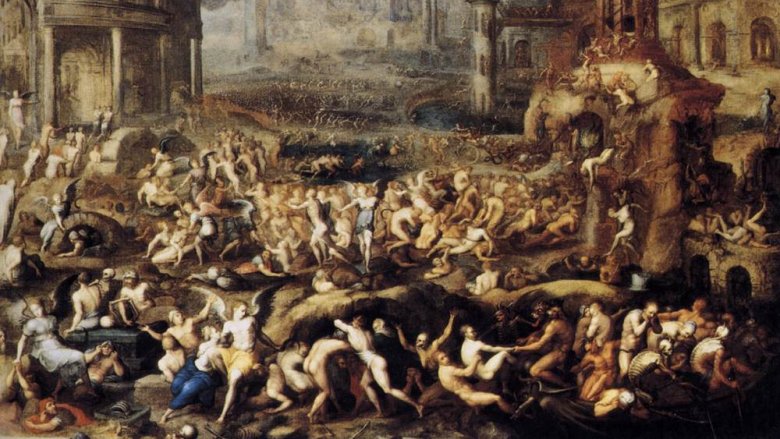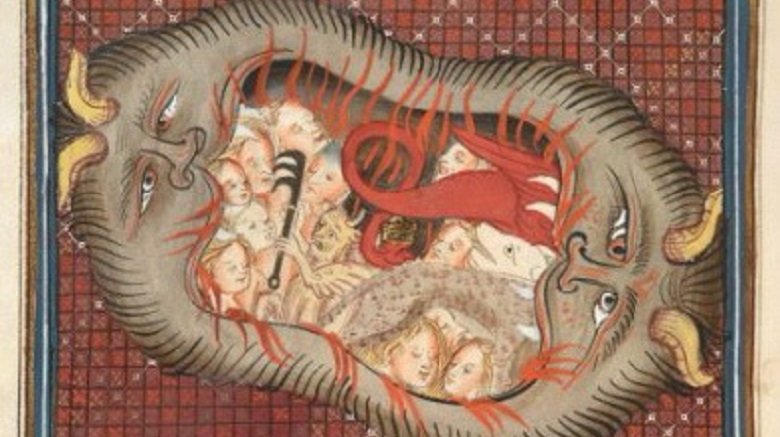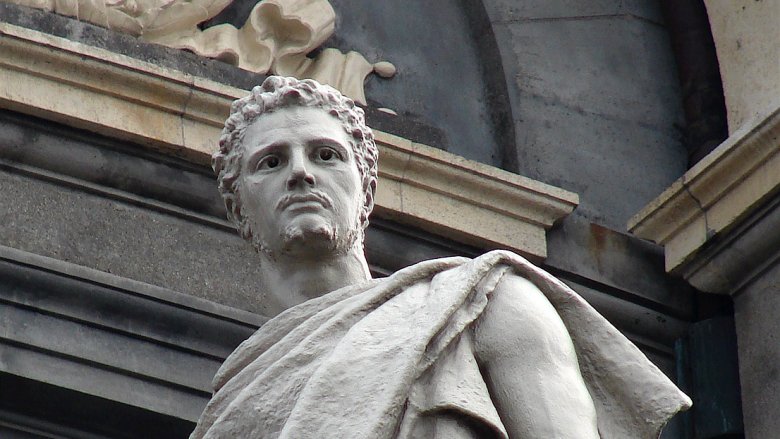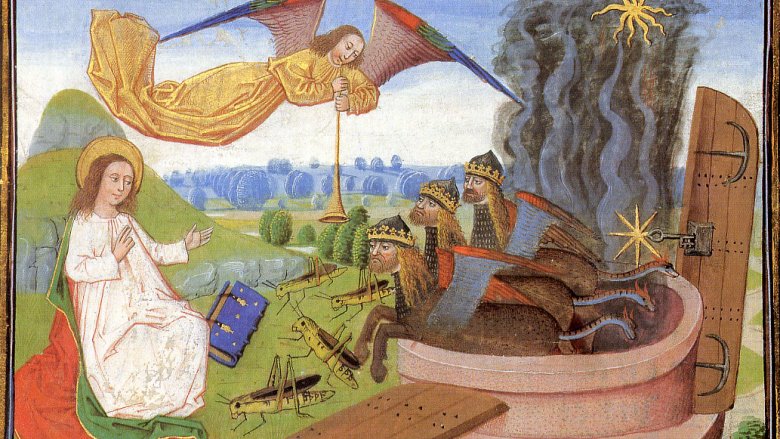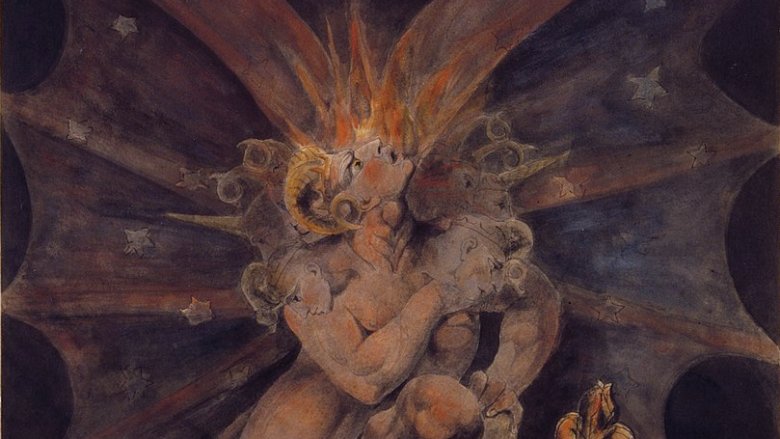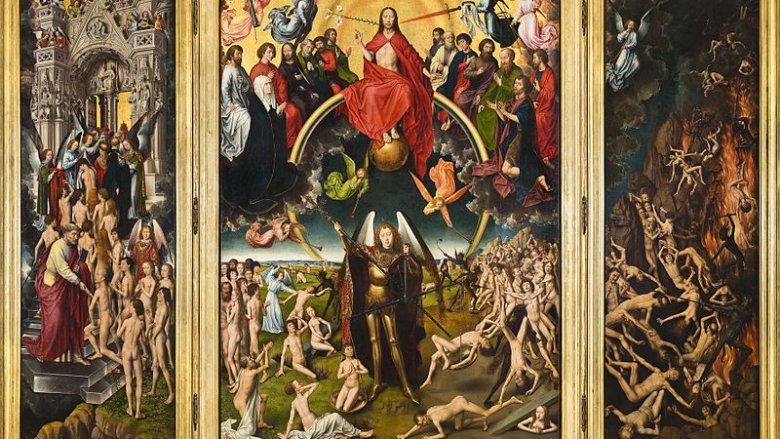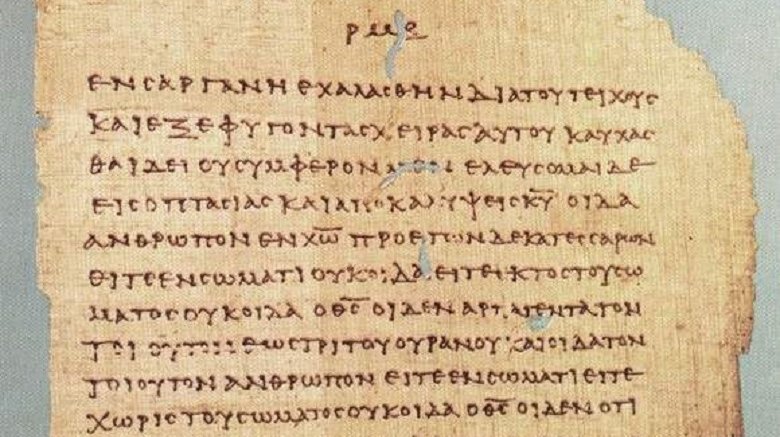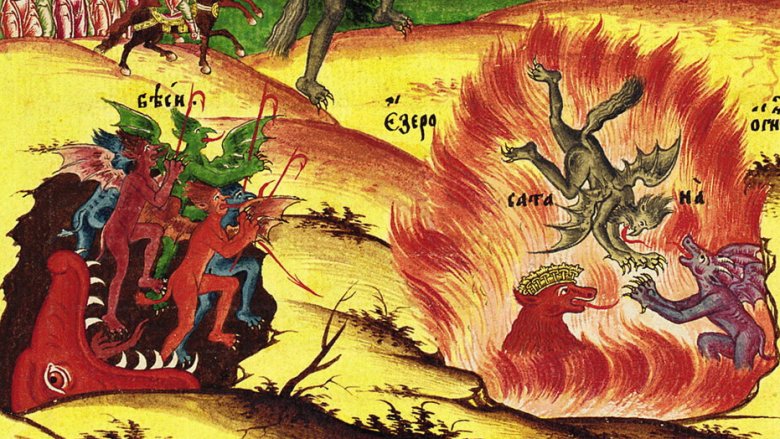The Untold Truth Of The Book Of Revelation
The Bible's Book of Revelation is basically a fever dream of epic proportions. It shows a vision of the world being destroyed in ways most modern horror writers would be hard-pressed to top. And of course, people today are still familiar with some of its most famous characters, like the Whore of Babylon, the beast marked 666, and the four horsemen of the Apocalypse. The story of Jesus defeating the Antichrist and returning to rule Earth is taken very seriously by many modern churches.
But Revelation (not "Revelations"!) is probably the most difficult book in the Bible to interpret accurately. It's lousy with symbolism and numerology and all these coded messages that your average reader no longer understands, and therefore often takes to mean something completely different. Then there's its bizarre history, from who actually wrote it to why it was added to the Bible to how it shapes foreign policy to this day. Let's dive into the Book of Revelation.
It's not actually about the end of the world
Many people interpret Revelation as a sign of what is going to happen in the future. But for its author, it wasn't a mystic prophecy of something that was going to occur thousands of years later, it was both rousing propaganda message and revenge fantasy all in one.
According to Elaine Pagels (via CNN), one of the world's best biblical scholars, the author of Revelation had just lived through an unimaginable catastrophe. In 70 A.D., an armed Jewish revolt in Jerusalem was put down by 60,000 Roman soldiers who also burned down the temple and destroyed the city. This was not how things were supposed to go. Early followers of Jesus didn't think his return was something far off, but very soon, even in their lifetimes. He was supposed to come back and destroy Rome, the empire that killed him. Instead, Rome was the one winning, and Jesus was nowhere to be found. What had happened to the plan?
So the author of Revelation, known only as John, wrote a book about how Jesus was totally going to return and annihilate those Romans. He was writing an anti-Roman propaganda slash rousing motivational tract. John was like a coach at halftime, if that coach was talking about forcing the opposing team to drink from a river of blood. The aim was to make sure the followers of Jesus didn't give up or despair. He was definitely going to come back and kick butt very soon.
It's almost cartoonishly violent
The Bible isn't the first book you might turn to for gratuitous violence, but it's definitely in there. And Revelation doesn't skimp. The teaching company Shmoop helpfully rounded up some of the terrible things that happen to people unlucky enough to live in the world described by Revelation. Everyone has heard of the four horsemen of the Apocalypse, but less well known are the horses of Revelation 9:17-19, which have the heads of lions and tails made of snakes. Those horses breathe "fire, smoke, and sulfur," and kill a third of all humans.
There are your standard horrible plague symptoms, like non-believers getting painful sores all over their bodies, being boiled alive by the Sun, or giant hailstones falling to the Earth and splatting people. But there are also some set pieces Hollywood would be proud of, like when the Sun goes black and the Moon turns to blood, or a dragon shows up and almost eats an infant.
Two of the most bizarre have to be the locusts and the wine press. The former descend on Earth but are given scorpion stings, which they use not to kill humans but "only to torture them for five months." The wine press is used to smoosh people to a pulp until their blood is flowing 5 feet deep through the streets.
Considering all that crazy is going on, no wonder Revelation says mankind will "long to die," but since they can't catch a break, they have no such luck.
Its inclusion in the Bible was all about one guy's power
Considering how much Revelation has shaped the world, it's extremely concerning that it probably shouldn't have been included in the Bible at all.
Christianity existed for hundreds of years without an official Bible. There were plenty of books being passed around, but no one had decided what was considered legit. Around 360 years after Jesus died, the process of putting together Christianity's holy book began, and Elaine Pagels says perhaps no one had more say over what made it into the New Testament than Bishop Athanasius.
Described as "pugnacious" and "fiery," this controversial dude managed to get deposed and exiled a whopping five times in his 46 years as a bishop. He also absolutely loved Revelation. He didn't love it because it spoke to him on a deep spiritual level but because he saw its potential as a way to attack any Christian who questioned his authority. Instead of non-believers and Romans being the enemy described in Revelation, he saw the bad guys as the people of his own religion who didn't do and say exactly what he thought they should. Including Revelation in the Bible meant he could threaten perceived heretics with that wine press stuff.
But many church leaders wanted to see Revelation end up in the scrap heap instead of closing out the Bible. Athanasius' predecessor called it "unintelligible, irrational, and false." Not a rousing endorsement of what some people now see as God's actual words, since in the end, obviously, Athanasius got his way.
There's debate about which John wrote it
The New Testament is just lousy with Johns. There are five, including obviously the big gun, John the Apostle who wrote one of the four gospels. So figuring out which "John" wrote Revelation has been a bit confusing for church leaders throughout history.
According to New World Encyclopedia, the traditional view is that the John who wrote the Book of John and the John who wrote Revelation are the same guy. This obviously lent a lot of weight to the final book of the Bible, if someone as important as one of the original 12 disciples wrote it. Apostle John was supposedly exiled to the Greek island of Patmos after being boiled in oil but coming out perfectly fine. Evidence for the same author include a few instances of similar word usage in both books, and that was enough to convince many early church fathers.
But modern biblical scholars don't agree. They think these guys were two very different Johns. First, the one that wrote Revelation can't drop his own name in the text enough, while the author of the Book of John never mentions his. While they do both call Jesus a lamb, they use different Greek words for that animal. And when it comes to the Greek, Apostle John writes it flawlessly, while Revelation John has a lot of mistakes and doesn't seem to be a native speaker. These, plus some major differences in theology, have modern scholars pretty sure they were different people.
The author didn't actually like mainstream Christians
While whichever John that wrote Revelation is considered a saint and just an all-around important guy in various Christian churches, he wasn't a big fan of the people who actually started those religions. To an even greater extreme than St. Peter, John was Jewish through-and-through, not what we would consider Christian today.
Biblical scholar Elaine Pagels has great insight on this. In the early years of the Church, there wasn't one agreed-upon way to be a Christian. Different sects were fighting to become the biggest and most "correct." The John who wrote Revelation was very much of the idea that Jesus had come to be the Jewish messiah. This put him at odds with Paul, the guy who more than anything shaped the version of Christianity that "won."
John wanted traditional Jewish values to continue. He didn't like that gentiles (non-Jews) could become followers of Jesus without adhering to the rules set out in the Torah (like eating kosher or, for men, getting the fore-snip). He was against female leaders (at one point in Revelation he refers to a woman with power in an early church community as a "Jezebel") and against intermarriage between Jewish followers of Jesus and gentile followers. He didn't even want the new churches to accept gentile members, calling one that did a "synagogue of Satan."
Even at the time these views would have seemed old-fashioned to many new Christians. It makes sense John's version of the budding religion was the one that died out quickly.
666 has absolutely nothing to do with the devil
As CNN points out, some people might have gotten their ideas about the Antichrist and the sign of the beast, 666, not from actually reading Revelation but from watching The Omen.
666 and the beast were never supposed to represent a future evil Antichrist who Jesus would return and defeat. Revelation is just lousy with numerology (the number 7 shows up a ton), and 666 is very much part of that. The verse in question says, "Let the person who has insight calculate the number of the beast, for it is the number of a man. That number is 666." The number was never meant to be random; it stood for a very specific name: that of the Emperor Nero.
Christians had good reason to absolutely hate Nero, since he'd cracked down on their religion violently, including a rumor he'd used Christians as torches in his garden by burning them alive. He was the ultimate baddy, so he got specially singled out as an evil beast. John couldn't get away with openly writing bad stuff about Nero, so he used the Jewish numerology system, which the right readers would've easily been able to crack.
Nor is the "mark of the beast" actually on the beast, it's on everyone else. Revelation 13:16-17 says the beast made everyone on Earth get this mark or they couldn't buy and sell anything. Elaine Pagels says this might have stood for Roman imperial stamps, coins, or even official tattoos.
There have been a ton of failed doomsday predictions based on Revelation
Since Revelation is often interpreted as the story of a future apocalypse, it gets cited as proof of an upcoming apocalypse by a lot of end time prognosticators.
In the old days it wasn't people you'd consider crazies, either. Scotsman John Napier, born in 1550, is celebrated for his contributions to math and science, but less so for his writing on Revelation that predicted the world would end in 1688 or 1700. Conveniently for Napier, he would be six feet under by that point, so he'd never find out he was wrong. Same with the German pastor Johann Bengel, who calculated the thousand-year reign of Christ prophesied in Revelation would begin in 1836. (Bengel would have had to live to 149.)
According to Encyclopedia Britannica, David Koresh of the Branch Davidian cult saw himself as the lamb mentioned in Revelation and was preparing to open the seven seals to bring on the end times (which he took to mean he should publish a book) when he and many of his cult members died in Waco, Texas, in 1993.
These days David Meade interprets a description of a woman in Revelation to mean a complicated astronomical combination of the constellation Virgo, the planet Jupiter, the Moon, the Sun, and various other stars and planets, will bring on the beginning of the end. He first announced this would happen September 23, 2017. Being wrong didn't dissuade Meade, and he set the for-real date as April 23, 2018. That one missed, too. Darn!
It's not the only apocalypse book
Revelation stands out in the Bible because it's so drastically different in style and tone from virtually all the other books. That's because it's the only example of apocalypse literature that made it into the final cut. But it's far from the only religious tome from that time that covered trippy, end-of-the-world scenarios.
According to PBS, Jews started writing apocalypse literature around 300 B.C. They were heavily influenced by the Zoroastrianism of the Persians, as well as the destruction of Jerusalem a couple hundred years before. This genre of writing usually included a cosmic battle between good and evil, one or more messiahs showing up to fix everything, and an end to the current terrible times, giving way to a wonderful age. Written around 90 A.D., the Book of Revelation is actually a pretty late addition to this canon.
While it's the only official biblical apocalypse book, Revelation does have some apocryphal competition. At almost the exact same time John was dictating his vision on Patmos, someone was writing IV Ezra. Also known as the Apocalypse of Esdras, the Catholic Encyclopedia says it was taken seriously as a holy book by many of the early church fathers, and by Christians in general well into the Middle Ages. Christopher Columbus even cited it as proof there was a lot more land than water on the Earth. In general, IV Ezra isn't as over-the-top as Revelation but still relays plenty of crazy visions about the end times.
You can visit the cave it was written in
If you ever wanted to visit a holy place and get a nice Mediterranean vacation out of it as well, the cave of the apocalypse should be on your list. John wrote in Revelation 1:9 that he was on the Greek island of Patmos when he received his vision and dictated it to his disciple Prochoros. However, the claim that we've found the exact cave he did this in is just based on legend. Still, it's important enough historically that both the cave and the monastery built around it in the Middle Ages were granted UNESCO World Heritage status in 1999.
Despite the lack of proof, the cave of the apocalypse, now usually called the Holy Grotto, has been a popular pilgrimage destination for hundreds of years. Visitors still show up by the thousands. The entrance is now surrounded by the monastery, but you are allowed to go in the cave itself. There's a mosaic showing John getting his visions and the cleft in the rock where the voice of Christ supposedly came from. A fenced-off area is alleged to be where John slept every night (no one seems to care where poor Prochoros got his Z's), and there's even the rock he used as a pillow. The indentation his head made from repeated use is outlined in silver. To add to the realism, a monk sits on the rock and tells visitors how the book was written. Once you get your spiritual fill, it's time for ouzo.
It has influenced America's Israel policy
Evangelicals have an inordinate amount of influence on America's Middle East policy, specifically when it comes to Israel. If a politician isn't evangelical themselves, they still want that large voting bloc to support them, which sometimes means supporting a foreign policy based on Revelation.
One former Liberty University student wrote in America Magazine that in college he was taught the establishment of the nation of Israel in 1948 was proof the end times were nigh. According to evangelical interpretation of Revelation, before Jesus can come back, Jewish people have to return to Israel, rebuild the temple, and accept Christ as their savior. This will trigger the end times. So the establishment of Israel was evidence it's the beginning of the end, and protecting Israel's existence is vital for the fulfillment of Revelation events. In fact, a 2015 survey found 73 percent of evangelicals believe "events in Israel are part of the prophecies in the Book of the Revelation."
CNN says this was why it was such a big deal for evangelicals when President Trump moved the U.S. embassy to Jerusalem in May 2018. They saw it as another "fulfilled prophecy."
Of course, according to the (left-wing) Daily Beast, none of this has anything to do with caring about Jews and wanting them to have their own country. Evangelical interpretations of Revelation see members of that religion as merely pawns in a horrible end time scenario where most of them suffer and die. It's a bizarre thing to base a country's foreign policy on.
There are four different ways to interpret Revelation
The Book of Revelation means different things to different people. It all comes down to which of four main ways they interpret it. According to New World Encyclopedia, the four horsemen in Revelation stand for war, famine, death, and either Christ or the Antichrist, depending who you ask. But even then, what they mean for the world is totally contingent on which of those four ways you read the book.
Using preterism, we've got nothing to worry about. People who take this view think John was talking about events that had already happened, between the ministry of John the Baptist and the fall of Jerusalem in 70 A.D. The four horsemen have come and gone.
But believers in futurism think nothing mentioned in the book has happened yet. Every single thing is going to occur some time in the future, so we've got lots of terrible destruction to look forward to. On the other hand, historicism says we're in the middle of the events of Revelation right now. They started 900 years ago and some of the horsemen have already been causing trouble, while others are still to come. Futurism and historicism are the two interpretations U.S. policy is sometimes based on.
Finally, allegory means taking a purely spiritual view of Revelation. Nothing in it is literal; it's a symbolic story that's meant to be interpreted by individuals. So any death, famine, and war the world is going through is entirely non-horsemen-related.

